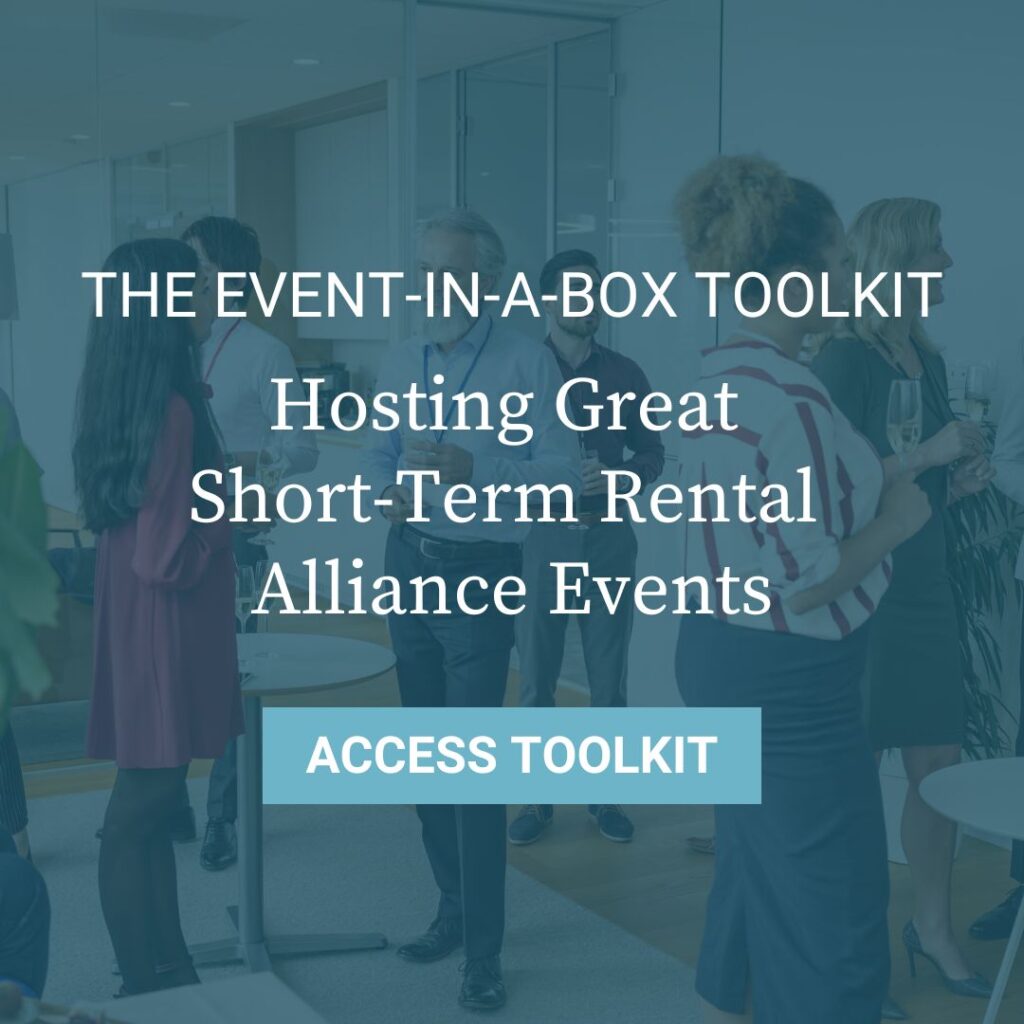Holding events – both virtual and in-person – is an excellent way to build support and a sense of community for your short-term rental alliance. Whether it’s a membership drive, donation drive, networking event, or all-in-one, an event can help you accomplish your alliance’s goals while fostering connection. Bookmark these strategies for holding great alliance events.
Plan your event well
Define your event goals
What do you want to accomplish through the event? Do you want to grow your membership? Are you raising money for an advocacy campaign? Are you trying to educate members about a new or developing short-term rental regulation?
If you want to increase your membership, make sure your presentation outlines the benefits of membership and how membership dues are used as well as the alliance’s goals for the next year.
This is also the time to formulate your request or call to action. What do you want attendees to do during or after the event to help the alliance accomplish its goals? This request usually is made at the end of the event, but it’s a good idea to tease it throughout the event so that anyone who leaves early doesn’t miss it.
Tailor your alliance event to your audience
Who do you want to attend your event? Once you know that, tailor the event content, speakers, and activities to your audience so it has value for them.
For example, at a membership drive, focus your content on what membership dues pay for and how that accomplishes the alliance’s plans and goals. Hold a Q&A session with alliance board members so that attendees can gain clarity on the benefits membership brings.
You can also illustrate the benefits of membership by inviting an existing member to share their story about how membership has helped them navigate challenges and grow their business.
Another option is to invite industry experts to discuss current STR trends, challenges, or the importance of advocacy. These experts can show how belonging to an alliance is essential for staying informed and competitive.
If your event is for existing members, consider inviting speakers who are industry experts, local authorities, or an active member who has a topic that will inspire and motivate others. For example, a local city official could talk about upcoming regulation changes or an expert could discuss technology or best practices that could improve members’ businesses in some way.
Avoid the ‘planning fallacy’
The planning fallacy is a term used in psychology to describe the tendency to underestimate how long it will take to complete a task.
Regardless of whether your event is virtual or in-person, allowing yourself more time than you think you need to prepare for the event will increase your chances of success and reduce your stress levels at deadline time.

Practice public speaking for your event
Public speaking doesn’t come naturally to everyone, so you might want to prepare yourself. Record yourself speaking and then review the footage for areas where you could improve like avoiding using fillers like “ummm.” Make the presentation conversational. Interact with your audience with prompts and polls. Have an outline of your presentation and answer any questions that might come up. Develop a script but don’t read directly from the script. Glance at it now and then to stay on track and have visual cues.
If you’re in a virtual event, practice looking into the camera. Try different camera angles so your audience can see you clearly. Maintain good posture and avoid looking at your phone.
Consider your background and lighting. Is the room where you’ll be tidy? Would a professional Zoom background be a better choice? How is the lighting in the room? What is your attire? Does it suit the audience? Is it a more formal or casual group?
READ MORE: Public Comment 101: Effective Written and Spoken Testimonies
Virtual event tips
Map out the event for yourself and your audience. Set an agenda and share it in an opening slide as well as in advance as part of promoting your event.
Invite industry leaders, subject matter experts, and thought leaders to present at your event. This will enhance your alliance’s credibility and attract attendees.
Create a prep sheet with websites, email addresses, and links to information that attendees may request or want to know during the event.
Hold an event practice session
Whether it’s your first event or 50th, a practice run before the actual event is essential to help you see what could go wrong and resolve any technical malfunctions.
Practice session checklist:
- Does the slide deck work? Are there any typos in the slides?
- Are you signed into Zoom or your respective video conference platform? Does it load properly? Can others join the call?
- Have you authorized audio on the video conference platform? Are your speakers and microphone working?
- Familiarize yourself with the screen or monitor you’ll be using to present from and which screen you’ll be engaging with the audience.
Get to know attendees and foster connection in the chat
Hosts often work in isolation from each other. Alliance events are an opportunity for short-term rental professionals to connect and feel a sense of community. But community doesn’t just happen. As the organizer, you can help spark these connections by prompting interaction between attendees and having resource links ready to share throughout the presentation so attendees can follow up after the event.
You can also get to know your audience by asking some poll questions at the beginning of the event and then adjust your presentation accordingly. For example, if your event is a membership drive, you could ask the attendees, “How familiar are you with our alliance and its benefits?” or “Have you considered becoming a member of our alliance before today’s event?”
Hold a Q&A session
A question-and-answer session during your event is a great way to engage with your audience and address common questions. Try to anticipate common questions that attendees might ask and prepare those questions in advance. You also can ask attendees to submit questions in advance or live at the event. Either way, choose questions that are commonly asked.
If attendees send long or hard-to-understand questions, distill the questions down to one sentence. If attendees ask a question that is specific to them, do your best to broaden or reframe the question to make it applicable for others. For example: My home is in [specific ZIP code/district/neighborhood] which is partly outside the city. Does this apply to me? Reframe: What is the geographical boundary this ordinance applies to?
Read more: THE EVENT-IN-A-BOX TOOLKIT: Creating great short-term rental alliance events
In-Person Event Tips
For in-person events, you’ll need to find a location that can host the number of attendees you’re expecting. Make sure the location is accessible to everyone. If it’s on a second floor, make sure there’s an elevator, for example. Consider involving local businesses that would be good resources for hosts and managers and also could benefit from gaining new clients in the community.
When scheduling the event, consider a time that would allow the most attendance and plan food and beverages accordingly. Happy hours are usually a good time when you can offer beverages and appetizers.
Make sure the venue has working audiovisual equipment or rent your own and check that it is functioning properly well before the event.
As mentioned above, hosting and property management can sometimes be solitary professions. So make sure that attendees have name tags so they can get to know each other and weave in mingling time or prompts to get people talking to each other.
Provide valuable information like updates on regulations, industry news, or opportunities to meet election candidates or experts.
Anticipate frequently asked questions and moderate a Q&A. This could be related to the presentation or could deal with your objective for the event like promoting memberships. If you are looking to promote memberships, prepare a one-sheeter with membership pricing and alliance goals and accomplishments for attendees to read and take home with them.
Give back
To enhance your alliance’s sense of community, consider giving back to a good cause at your event. For instance, you could fundraise for a specific nonprofit organization or do a volunteer drive.
Make it fun
While it’s important to stay focused on your objectives, don’t forget to make the event fun. In virtual events, incorporate music, polls, and humor.
During in-person events, get creative. One idea is holding a bingo scavenger hunt to promote mingling and networking. Include the names of event sponsors to encourage attendees to connect with them and drive value for their investment. Here’s an example from the Mile High Hosts Happy Hour in Denver, Colorado.

Prolong the impact of the event
After the event is over, there are things you can do to make it go farther. Send an email thanking attendees for their participation. Reiterate your call-to-action and capitalize on the interest and engagement of the event by inviting questions.
Write a recap of the event with links to important resources, the recording of the event, and the slide deck, if applicable. This will allow the attendees to look back on the content of the event as needed or share it with others, expanding your reach. For more detailed tips on creating a short-term rental alliance event, download our Event-in-a-Box Toolkit.
…
SUBSCRIBE TO GET UPDATES



